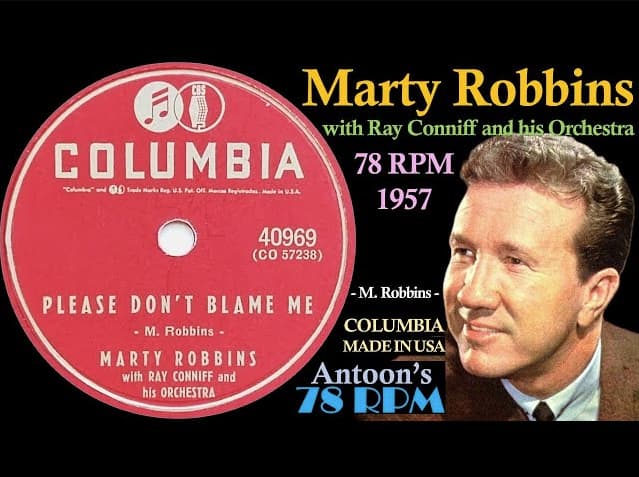
Marty Robbins – “Please Don’t Blame Me”: A Heartfelt Plea Wrapped in Timeless Melody
In the rich tapestry of American music, few voices resonate as deeply as that of Marty Robbins. Born out of the dusty plains of Arizona, Robbins’ voice became a beacon for those yearning for tales of love, loss, and redemption. His 1957 release, “Please Don’t Blame Me,” is a poignant testament to his ability to capture the complexities of the human heart with simplicity and grace.
When “Please Don’t Blame Me” was introduced to the world, it quickly found its place in the hearts of listeners, debuting on various charts with a respectable position. Though it may not have soared to the very top like some of Robbins’ other hits, its impact was no less significant. The song resonated with those who had experienced the bittersweet edge of love’s challenges, and it showcased Robbins’ unparalleled ability to connect with his audience on an emotional level.
The story behind “Please Don’t Blame Me” is one that many can relate to—a tale of regret and longing. It speaks from the perspective of a lover seeking understanding and forgiveness. The lyrics convey a deep sense of remorse and a plea for empathy, making it clear that love, while beautiful, can sometimes lead us astray into misunderstandings and unintended hurt. Robbins’ delivery is gentle yet powerful, each word dripping with sincerity and a yearning for reconciliation.
The meaning embedded within this song is universal. It’s a reflection on human imperfection and the desire for connection despite our flaws. In a world where pride often stands in the way of mending broken bonds, “Please Don’t Blame Me” serves as a humble reminder that vulnerability can be a bridge to healing. The song’s narrative urges us to look beyond blame and find compassion in our hearts—a timeless message that remains relevant across generations.
Robbins’ musical arrangement complements the lyrical content beautifully. The melody is both haunting and soothing, weaving together elements of country and pop that were characteristic of Robbins’ style during this era. The instrumentation is understated yet effective, allowing his rich vocals to take center stage. As the song unfolds, listeners are drawn into a world where emotions are laid bare, inviting them to reflect on their own experiences with love and forgiveness.
For many older listeners who may have first heard this track on vinyl or over the radio waves in the early ’60s, “Please Don’t Blame Me” evokes a strong sense of nostalgia. It calls back memories of simpler times when music served as both entertainment and solace—a faithful companion through life’s ups and downs. The song’s enduring appeal lies in its ability to evoke these personal memories while also speaking to universal truths about love and reconciliation.
As we revisit Marty Robbins’ “Please Don’t Blame Me,” we are reminded not only of his extraordinary talent but also of the power music holds in connecting us through shared emotion. This classic piece continues to resonate today, offering solace and understanding to all who pause to listen—a timeless treasure from one of America’s most beloved musical storytellers.